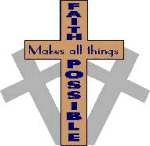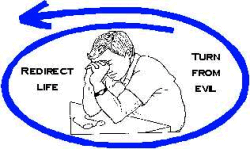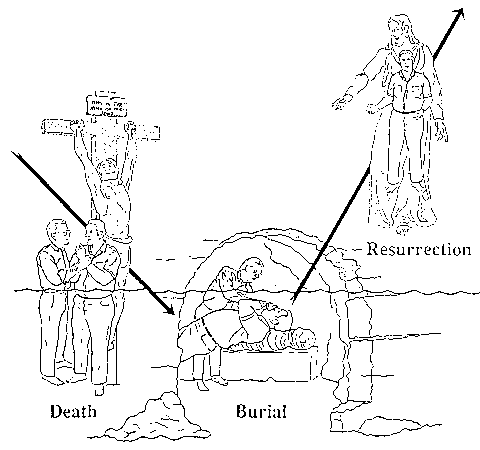One of our serious objectives is to share our faith in and love for God. We want to:
- Encourage people to move toward a complete relationship with God.
- Be a spiritual blessing in our community.
- Help people find personal salvation in Jesus Christ.
- Help people become a part of God's family.
- Find salvation that results in eternal rest with God.
This congregation focuses on the "real life" of now and on eternal life with God.
Who Are We?
In America, we come from a religious movement that began about 1800.
 Concerned Presbyterians, Baptists, and Methodists produced the American
restoration movement. The movement began in different areas of America in a
desire to eliminate religious division. Their goal (and ours) was to allow
the Bible to be the guide in matters of faith and doctrine.
Concerned Presbyterians, Baptists, and Methodists produced the American
restoration movement. The movement began in different areas of America in a
desire to eliminate religious division. Their goal (and ours) was to allow
the Bible to be the guide in matters of faith and doctrine.
We seek to be simply Christians. We want to be nothing more or less than Christians. We do not try to reproduce Bible cultures. We try to understand and live by Jesus Christ's principles and teachings.
We try to emphasize the same teachings the church in the New Testament
taught. Three areas of spiritual development are emphasized:

- growth in our understanding of God's purposes and intentions;
- growth in an understanding of God's purposes in Jesus Christ; and
- growth in an understanding of the Bible.
We are dedicated to relationship with God through Jesus Christ. Relationship with God and Christ must be reflected in our relationships with people.
We are independent. We are not a part of or indebted to any national or international religious group. This congregation provides its own leaders, makes its own decisions, and chooses its own activities. We genuinely desire to be faithful to God's purposes, Jesus Christ's Lordship, and the Bible's message.
We are human. Our actions, knowledge, understandings, and relationships are not perfect. People in this congregation reflect every level of spiritual development. There is enormous diversity. Hopefully, everyone is mutually committed to Jesus Christ.
Basic Views
God is the living God Who is the source of all existence (Acts 17:24-28). He is the source of life, and He sustains life. When evil separated people from God, God began to produce the means to destroy that separation. God created the means by giving the world a Savior, Jesus Christ.
Through Jesus' death and resurrection, God made Jesus the Christ (Acts
 2:36). Jesus' position as Lord is the result of God's intention, plan, and
purpose. Jesus is God's perfect sacrifice for sin (Hebrews 10:10,14). He
willingly gave his blood in death to produce permanent atonement. Jesus'
blood "covers" our evil. Our forgiveness is possible because of His blood
(Ephesians 1:7). He is our mediator [representative] before God (1 Timothy
2:5). Through Jesus Christ, any person can approach God (1 Timothy 1:15;
2:3,4).
2:36). Jesus' position as Lord is the result of God's intention, plan, and
purpose. Jesus is God's perfect sacrifice for sin (Hebrews 10:10,14). He
willingly gave his blood in death to produce permanent atonement. Jesus'
blood "covers" our evil. Our forgiveness is possible because of His blood
(Ephesians 1:7). He is our mediator [representative] before God (1 Timothy
2:5). Through Jesus Christ, any person can approach God (1 Timothy 1:15;
2:3,4).
The Holy Spirit lives in those who are in Jesus Christ (Acts 2:38,39; 5:32). The Spirit encourages Christians (Romans 8:26). The Spirit also assists us in communicating with God.
 The Bible exists through God's guidance and work (2 Timothy 3:14-17). We
accept the original writings to be inspired and without error. While every
translation has limitations, we accept serious translations as reliable
guides to salvation in Christ and godly living.
The Bible exists through God's guidance and work (2 Timothy 3:14-17). We
accept the original writings to be inspired and without error. While every
translation has limitations, we accept serious translations as reliable
guides to salvation in Christ and godly living.
Conversion
Accepting God's salvation in Christ requires our response. We understand salvation is God's gift extended through His grace (Ephesians 2:8-10). While we accept that gift, our response never merits that gift. We obey to show our love for God and Christ, not to obligate God and Christ. Following is our understanding of the people's response to God's gift.
A person should understand God's basic purposes in Jesus Christ (Acts 8:31-35). He or she must trust God's promises stated in those purposes. God's purposes include these understandings:
- Jesus is God's Son (Matthew 3:16,17),
- God's forgiveness is made possible through Jesus (Acts 2:38), and
- Jesus makes it possible for a person to come back to God (2 Corinthians 5:20,21).
Conversion faith trusts God's work in Jesus, and trusts Jesus as Lord.
A person who recognizes his or her evil and wants God's forgiveness
redirects his or her life (Luke 15:1-21). This person is sorry for his or
her involvement in evil. He or she is sorry for the hurt his or her evil
 caused God. While this sorrow is proper, redirection of life is more than
"being sorry" (2 Corinthians 7:10).
caused God. While this sorrow is proper, redirection of life is more than
"being sorry" (2 Corinthians 7:10).
Repentance is the decision and commitment to turn life around and live differently.
Because of baptism's first century meaning and the New Testament's teachings, we immerse. Immersion occurs when a person who believes in Jesus Christ chooses to redirect life (Romans 6:3-9). Immersion occurs because of the decision of a knowing, understanding person. If there is no faith or repentance, we understand immersion to be a meaningless act. When a person believes and repents, immersion allows him or her to participate in Jesus' death, burial, and resurrection.

The person who trusts Jesus Christ, who redirects life, and who is immersed receives God's forgiveness. By God's act, the person enters God's family [Christ's body, the church (Ephesians 1:22,23; Acts 2:47)]. We do not place a person in the church. God does.
We do not practice infant baptism because infant baptism is not the choice of the person. It does not declare the person's faith. It is not the result of the person's choice to redirect his or her life. In our understanding, the absence of infant baptism does not place a child at spiritual risk. In our understanding, a child needs no forgiveness (Mark 10:13-16).
The men who lead this congregation in public acts of worship are persons whose faith in Christ and repentance resulted in immersion into Christ.
Worship
 Communion is shared each Sunday. Again, evidence agrees the early church
shared communion [the Lord's Supper] each first day of the week. We do not
regard communion as "a religious rite that produces benefit" just because it
occurs. Communion is an act of Christian worship that involves
concentration, awareness, and gratitude (1 Corinthians 11:23-30). It is a
time for individual Christians to reflect on Jesus' death and to remember
His sacrifice. This act of faith must express the Christian's heart and
mind.
Communion is shared each Sunday. Again, evidence agrees the early church
shared communion [the Lord's Supper] each first day of the week. We do not
regard communion as "a religious rite that produces benefit" just because it
occurs. Communion is an act of Christian worship that involves
concentration, awareness, and gratitude (1 Corinthians 11:23-30). It is a
time for individual Christians to reflect on Jesus' death and to remember
His sacrifice. This act of faith must express the Christian's heart and
mind.
 This congregation's work depends on its members for financial support. Each
week we financially contribute to maintain the congregation and to fund our
work. Each person makes his or her own decision about his or her level of
giving. [A list of our ministries is found in "What's Happening at
West-Ark?"]
This congregation's work depends on its members for financial support. Each
week we financially contribute to maintain the congregation and to fund our
work. Each person makes his or her own decision about his or her level of
giving. [A list of our ministries is found in "What's Happening at
West-Ark?"]
Leadership Structure
 Our elders provide shepherding guidance and congregational oversight. These
men serve the congregation in this role by the congregation's choice and
selection. Our deacons direct specific areas of work. These men are
recommended to the congregation by the elders. They serve as deacons by the
congregation's consent. Both elders and deacons are immersed believers who
have the qualities and character Scripture states (1 Timothy 3:1-13; Titus
1:5-9).
Our elders provide shepherding guidance and congregational oversight. These
men serve the congregation in this role by the congregation's choice and
selection. Our deacons direct specific areas of work. These men are
recommended to the congregation by the elders. They serve as deacons by the
congregation's consent. Both elders and deacons are immersed believers who
have the qualities and character Scripture states (1 Timothy 3:1-13; Titus
1:5-9).
Paid individuals serve as the staff of the congregation. The ministers are salaried by the congregation. They work with the deacons under the guidance of the elders.
Common Expectation
Every member should grow and develop spiritually (2 Peter 1:5-11). Everyone's common objective is spiritual maturity in Christ. Evidences of spiritual maturing include:
- personal faith in God and Christ;

- personal dedication to God's purposes and will;
- personal growth in a deeper understanding of the Bible;
- worship;
- involvement in congregational activities;
- godliness in family relationships;
- godliness in life relationships; and
- moral and ethical behavior.
The congregation is committed to developing and maintaining a godly atmosphere. The purpose of this godly atmosphere is (a) to promote personal growth in Christ and (b) to encourage spiritual development in service to the living God.
Romans 12:4-8, Just as each of us has one body with many members, and these members do not all have the same function, so in Christ we who are many form one body, and each member belongs to all the others. We have different gifts, according to the grace given us. If a man's gift is prophesying, let him use it in proportion to his faith. If it is serving, let him serve; if it is teaching, let him teach; if it is encouraging, let him encourage; if it is contributing to the needs of others, let him give generously; if it is leadership, let him govern diligently; if it is showing mercy, let him do it cheerfully.




